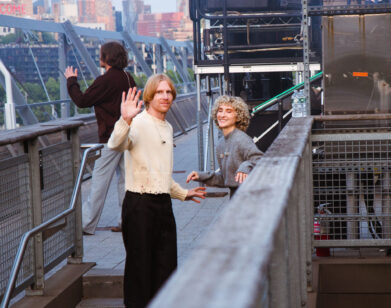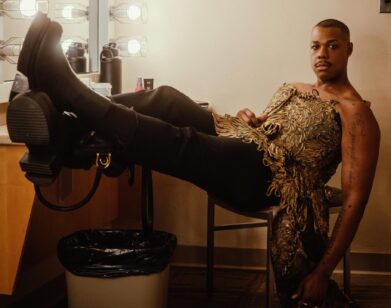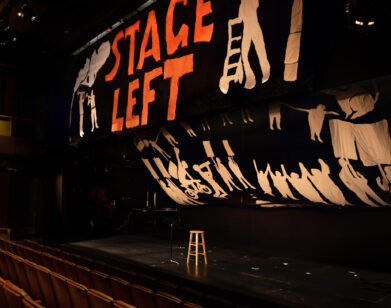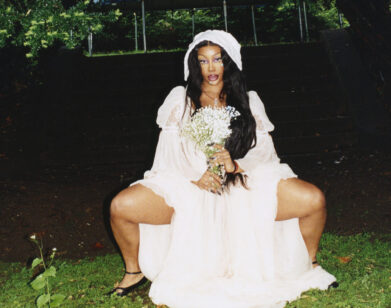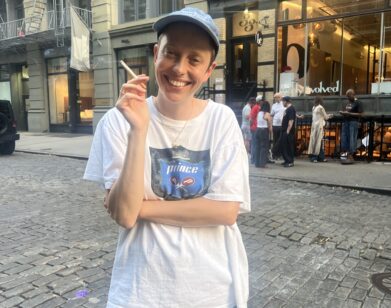The Brilliant Complications of Heidi Julavits
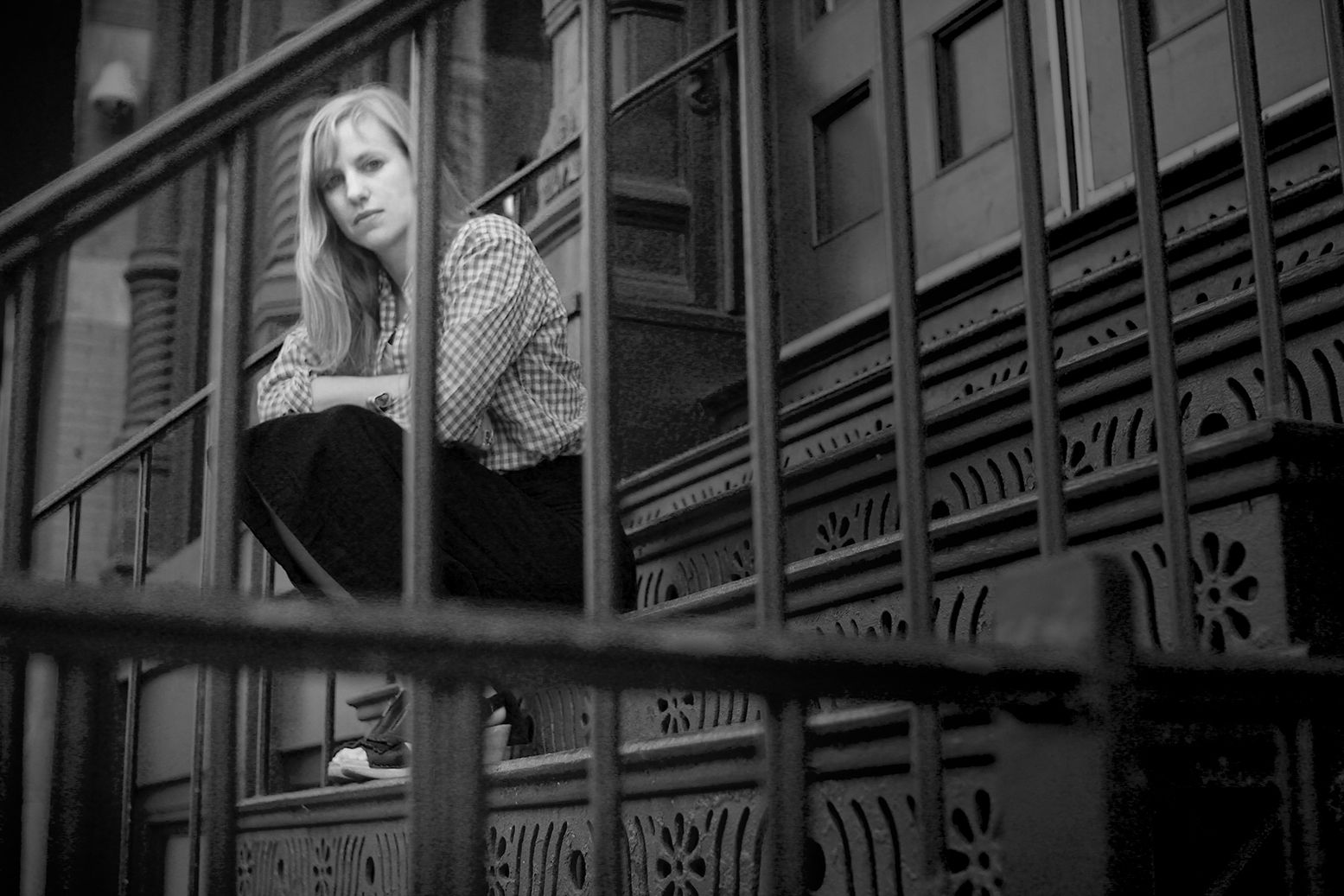
A prediction: Long after the top-tens of 2012 are counted and the book prizes are shortlisted and announced, Heidi Julavits’s fourth novel The Vanishers (Doubleday) will stand as one of the great, experimental novels of this decade. Julavits, author of the highly underrated 2003 terror novel The Effects of Living Backward, has used her narrative somersaults and female identity switches to frightening effect in the story of young psychic-in-training Julia Severn, who, while attending the Institute of Integrated Parapyschology in New Hampshire, crosses with her famous mentor who may or may not then seek revenge with a series of “psychic attacks” against her prodigal student. In an attempt to save herself from the sickening psychic assault, Julia becomes embroiled in the pursuit of a maybe-dead French feminist filmmaker named Dominique Varga, who might have had something to do with Julia’s mother before her own untimely suicide.
Crossing through Budapest spas (where Julia meets a strange aristocratic plastic-surgery patient named Borka), Parisian hotel rooms, and Julia’s own troubled familial history, a metaphysical detective story doesn’t so much unravel as tangle into a wonderful knot that only a writer like Julavits could dangle before us. While realities and double-crosses abound, some of the novel’s most beautiful prose is saved for the question of what can be known about a mother who decided to take her own life while her child slept next door. As Julia surmises about her mother near the end of the book: “I bet if pressed to choose, she wouldn’t have wanted our relationship, in so much as it existed, to be any other way. Not because she was a bad person. Because she was a person. Because who doesn’t want to be blamed by the people she love, or might have loved?” The 43-year-old Julavits has the extraordinary ability to write both compassionately and viciously in the same lines. It’s emotional honesty that Julavits is after, even in a world of face lifts, art-house porn films, disheartened souls purposely choosing to vanish, and mothers who detest their daughters.
Julavits is also the co-editor and co-founder of the literary periodical The Believer. She lives in Manhattan with her husband, writer Ben Marcus, and their two children. In early March she met me for lunch in Soho and we began with a whole conversation about our respective New York restaurant-waitering experiences in the ’90s, which led me to make a generalization about how “the younger generation” (people in their twenties) aren’t as good at being waiters as we are because they never learned the art of multi-tasking. I do not stand by this generalization, but it lead to Julavits mentioning a far more interesting generational observation. Which is where this interview picks up…
HEIDI JULAVITS: I don’t usually read my reviews. But for The Vanishers, they seem to be okay. I’ve noticed older reviewers are much more bothered by the plot complications. Younger reviews don’t seem to be bothered by the complications at all. So here’s my theory: we just watch way more TV than they do. I wonder if people like me, who spend far too much time watching shows like “Lost,” are less bothered by hyperactive, even convoluted plots that almost never resolve. I’m not defending plot complications, by the way. I know I have a plot problem.
CHRISTOPHER BOLLEN: No, you don’t.
JULAVITS: I have a bit of an addiction that I am trying to back off of.
BOLLEN: What’s the addiction?
JULAVITS: Just that I want the plot to be as complicated as possible. [laughs] Usually I’ll write all the way through to an end, and then I go back and try to fix the ending so that it makes sense. I don’t think out the plot ahead of time.
BOLLEN: At all?
JULAVITS: No. Because that wouldn’t be fun for me. I would feel like I was an architect executing a blueprint. If I’d done the discovery before I wrote the book, then there would be nothing to discover. It would feel dutiful instead of exciting.
BOLLEN: But the plot of The Vanishers is brilliantly laid out. You must at least make little destinations or mile markers for yourself to get to when you’re writing.
JULAVITS: Kind of not. And the problem that that creates—well, obviously that creates a lot of problems. It’s really not the most expedient or economical way to write a book. There are some writers who are done when they finish a draft because they’ve thought it through beforehand. Whereas I’ll finish a first draft and I’m nowhere near done. To me it mimics doing a logic proof, which I used to love. A logic proof is: you get a starting point and an ending point, and you have to get there through all these different steps and tautologies. I approach novel writing that way. When I get to the end I have to go back and connect everything.
I will say that The Vanishers was more of a muddle than any of the others when I finished. I was having this discussion with my husband Ben about what a hard time I was having with to different characters. One was Dominique Varga, this performance artist. And the other was this woman Borca, who the book’s protagonist befriends in this psychic attack/plastic surgery institute. I wanted both of these characters in the book. When my editor first read it, he said, “Dominique Varga, I don’t know if she belongs in this book. I’m not really seeing it.”
BOLLEN: The Dominique Varga character is my favorite part of the book.
JULAVITS: He liked it too, but he was just having a hard time, quite understandably. He wanted me to simplify things, and I completely agreed with him. What I often tell my students, in fact, is if somebody has a reader response that seems to conflict with what you desire, you can’t say, “Oh, well, that’s not a valid response.” If they say, “This character complicates the plot and you’d be better off to remove it,” your response can’t just be “I’m not cutting this character. You don’t understand me. You don’t understand the book!” What you have to do is make that character so crucial to the novel that no one has that response. That became my challenge.
BOLLEN: So you don’t feel a responsibility to tie up all of your loose threads at the end of your novels?
JULAVITS: Sometimes it can be useful to read your bad reviews. And one bad review I got for my last novel The Uses of Enchantment—probably the worst review I’ve ever gotten—was from a high-profile reviewer. She is not a fan of ambiguity. She doesn’t like ambiguous endings and I really am a fan of ambiguity. It’s very much a taste thing.
One of the paragons of the ambiguous ending is the ending of Todd Haynes’s film Safe. Where Julianne Moore has an environmental illness and seals herself in this bubble of a weird guru-led safe house. At that point she’s just rashy, and I love rashes. I have a rash obsession. [laughs] At the end she’s just staring at a mirror. One way to read that scene is that she’s saved herself and in charge of her life. She’s no longer this housewife who is allergic to the world around her. Or, she’s entrapped herself anew. How is living in this bubble different from living in the suburban bubble that she was in before? Both of those endings are totally possible, and I love that. Sometimes one ending wins out over the other. I’ve watched that movie so many times. It’s not a fixed response. Depending on where you are in your life you can respond differently. The film Marie Antoinette was like that too.
BOLLEN: I love that ending, where she just looks out the carriage and says, “I’m saying goodbye.” And that’s it. And you’re right. We’ve come under the influence of television, where in all honesty we can follow a show that could just get cancelled midway through the season and the entire plotline never resolves itself.
JULAVITS: Don’t you feel like they need to send out a memo on what the writers had intended? “If we’d been allowed to continue…”
BOLLEN: I prefer that it remain a mystery. It’s like a friendship. The punishment for you not tuning in enough is you never get to find out what went on with me.
JULITVITS: I have to say that bad review really struck a chord with me. I did take into consideration, how might I not turn off the reader or annoy the reader? The Vanishers still has ambiguity but I’m hoping it’s a little bit more resolved.
BOLLEN: You have a whole scene where you describe these previous performance works that Dominique Varga has done, including my favorite, where she stands weeping on the courthouse steps for 72 hours dressed in funeral attire during the trial of a serial killer of prostitutes. Varga is very Sophie Calle to me.
JULAVITS: Oh my God, I had her book sitting next to me the whole time I wrote that. I’ve always had a Sophie Calle obsession. But what really got me interested in this flipped approach to feminism, or anti-feminist feminism, was when I went to this conference at Columbia organized by my former college mentor. I studied women’s studies in college and unsurprisingly my formative class during my collegiate career was “Mothers and Daughters,” taught by Marianne Hirsch. Hirsh organized this panel. The academic Jack Halberstam, who looks very androgynous, was giving a talk about passivity as a form of feminist performance. One of her examples was the Yoko Ono’s Cut Piece, where Ono sits in a gallery with a dress on and people are invited to come up and cut off pieces of her clothes. What it’s doing is drawing out in them these seemingly instinctual responses to a woman in a dress who is just sitting there. The cutting gets more violent and more aggressive. And this idea of passivity is very different from the variety of feminism I was studying in the late ’80s and early ’90s.
BOLLEN: It’s a backlash to that ’70s white American feminism that says women can be just like men to the detriment of the powers of the feminine.
JULAVITS: Yeah. And then after the conference, I read this piece in Harper’s by Susan Faludi that was about “American Feminism’s Ritual Matricide.” Faludi talked about how the younger generation of women were always “killing” the previous generation as a means of “advancing” the feminist cause. This gave me serious pause, because I realized that I, too, had been a casual matricider back in the mid- to late ’90s, complaining about “feminine ecriture” and wishing for a less confining definition of what it meant to write feministically. This was a conundrum, and a guilt, that I was trying to examine—or purge—a bit in my book.
BOLLEN: It’s interesting that you paired that deadly mother-daughter relationship with many mentions of Sylvia Plath in the novel. Most people think of Plath as having father issues. But for The Vanishers she’s a matron saint of mother-daughter conflict.
JULAVITS: She totally had mother issues! Her mom drove her, drove her, drove her. And as with so many of us, her mom seemed to put all of her hopes and ambitions into her daughter. That happens a lot. Maybe that’s also what perpetuates this “kill the mother” phenomenon. It creates a lot of resentment and becomes an identity boundary that’s permeated, where the mom is so invested in the daughter’s success and living out her dreams that the daughter becomes an alter-ego. The daughter has to fight to break that and erect a firmer boundary. I should make it clear that I do not have this type of relationship with my mother, but that mother-daughter relationship really fascinates me.
BOLLEN: There really aren’t that many men in The Vanishers. It’s really an investigation of women’s relationships. Was that purposeful?
JULAVITS: I think female-female relationships interest me so much more because they’re so encoded. There is kind of a psychic element that happens within groups of women. Whenever I hang out with my female friends, I feel like context is never needed. They can just say two words about something, it’s like hearing the first two notes of a song and you can always identify the song. They can just say a word and I know exactly what they’re talking about. You just don’t need all this contextual build-up. My husband, on the other hand, is always accusing me of being a context-free individual. He asks something and he has no idea where it came from or what it related to. I have to supply him with way more supplementary information than I ever have to supply my female friends.
BOLLEN: How did you get the idea for the psychic attacks? I googled “psychic attacks” and they are an actual—or at least reported—phenomenon.
JULAVITS: It’s the literalization of a phenomenon that I think everybody has experienced in their real life, whether you believe it’s a “psychic attack” or not. There are people you hang around with, and their energy affects you differently. Without sounding New Age-y, there are people who I will be with and I think, “I have to get away from this person right now,” and not because this person is being mean to me or I don’t like them—it has nothing to do with that. There’s just something about the energy they’re exuding. Some people just make me feel mentally endangered. Whatever dark stuff is going on in their head, it’s coming at me and I need to escape.
BOLLEN: So you have felt psychically attacked before?
JULAVITS: Every once in a while when I get a migraine, I like to think, “Who hates me today?” [laughs] We’re not saints, any of us. Maybe somebody is, but I don’t know those people. But we all know people who behave very smugly and are very egotistical and put you down as a manner of improving their own place in the world or improving their own place in the world. So, of course, those people, you wish for their comeuppance. I actually ran into somebody the other day for whom I had wished this upon, because she had been so unbearably haughty and would look down on the things I did in my life. Her life is kind of a wreck now. She’s really humbled, and cowed, and I felt so horrible that I had ever wished anything upon her. Of course I don’t think that I am, in any way, to blame for the reversals of her good fortune.
BOLLEN: You probably weren’t the only one psychically attacking her. Those kinds of people tend to cultivate many enemies.
JULAVITS: Maybe it came in a lot of different directions. But the dreamed outcome of launching a psychic attack can make you feel small and petty. I think for that reason I’m going to refrain from launching any. Also, it’s not wise from a personal-health standpoint. When you are expending that much energy on someone else’s demise, it’s like you weaken your psychic immune system.
BOLLEN: Did you make up the Psychic Institute where the protagonist, Julia, trains?
JULAVITS: I did make up the institute, but a lot of the psychic-attack dynamics comes from a book that was written in the 1930s by Dion Fortune called Psychic Self-Defense.
BOLLEN: Have you ever been to a psychic?
JULAVITS: I did go to one after I finished the book—probably just in case someone asked me in an interview, I felt the prudent answer would be yes. One of the things I asked the psychic was if Dion Fortune approves of my using her story. Because I do take her story. She opens Psychic Self Defense with a true story of her being psychically attacked by her jealous mentor. So I asked this psychic, “What does she think?” Because you can be psychically attacked by a dead person, too. Thus my concern.
BOLLEN: She could be haunting you at your readings. Make your hair fall out during book signings, collapse on the radio. What did the psychic say?
JULAVITS: She said that the ghost spirit was humored by the whole thing. She approved, and she was laughing.
BOLLEN: I think of you as an experimental writer. And during the course of reading the novel, it occurred to me that most experimental writers in contemporary American literature are male. Do you feel like you’re writing against the grain of traditional fiction?
JULAVITS: I obviously read and adore traditional fiction. I teach traditional fiction, I also teach all kind of not-so-traditional fiction. And since I’m such a plot buff, and I’m really such a narrative buff, I can’t seem to relinquish my—not just reliance—but excitement about those traditional techniques. However, the narrative technique that I feel most bothered or perplexed by is flashbacks. How do you give a sense of depth to a story without going back in time? How can you really get to know a character, if, for example, we only knew each other from this point forward, no back-story. That said, when I’ve tried to do books where I disallow back-story, I start to feel really confined. The pressure to be in the present all time can make you feel claustrophobic. So it’s not, just I think to a need to develop a context or a 3-D-ness to a character. As a writer, you want to go somewhere else sometimes. You want to vary the terrain that you’re exploring. So, with my novel The Effect of Living Backwards, I found a way to get out of the present-tense airplane drama.
BOLLEN: You broke up the airplane hostage story with each airline passenger’s “shame story.” In alternating chapters, each character delivered a monologue about a tragic or shameful experience from their past.
JULAVITS: The shame stories were a way to provide back-story for people, but I was obviously using as a template The Decameron, where in which people are stuck together in a place, and entertain each other by telling stories. But it also entertains me. I have to be entertained. Again in The Uses of Enchantment, three strands are interwoven and they were all three from different points in time, and one even is a hypothetical strand of past—did it happen, did it not? That allowed me various escape valves so I could remain interested in the story. In both of those cases, structure was really fascinating to me.
BOLLEN: I was always struck by how you managed to write The Effects of Living Backward so soon after 9/11. It came out two years after, and it’s quite a large book on terror.
JULAVITS: I wrote it before 9/11. I finished it about two weeks before 9/11, so let us just say the timing was quite horrible when I passed in my manuscript.
BOLLEN: Oh no. A plane hijack story. They must have said, “Are you kidding?”
JULAVITS: The “H” word. Hijacking. I had to re-tailor how people respond to being hijacked. Prior to 9/11 it was sit back, don’t be noticed, and hope that it all works out.
BOLLEN: Be passive.
JULAVITS: Hope they don’t pick you to shoot as a means of bargaining. Keep your head low. Now, you have to act. So I started to think, “Is this an old-fashioned hijacking where you behave passively or is this I’m-going-to-be-used-as-a-bomb hijacking, and I’m going to die anyway, so I might as well die trying to overpower these people.” There’s a part in the book where I say that in the seat back now there’s a pamphlet that advises you how to make that decision, so imagine this, imagine that you misread the hijacker, you think that they are going to use your plane as a bomb or a weapon and they’re not, and then you attack them and the plane crashes and if you had just sat it out, you all would’ve lived. Suddenly there’s a decision to be made, and you could make the wrong one.
BOLLEN: People don’t hijack planes anymore because that old system of hijacking in order to barter for a prison release or get to a different country no longer works, exactly, because 9/11 recoded the hostage’s interpretation of a hijack. If a hijacker isn’t trying to use the plane as a missile, then he is in danger of being killed by the hostages. There is no minor terror threat anymore. No mid-level terrorism.
JULAVITS: You could imagine the situation where, weirdly, the hijacker is in this salesman position. They have to sell the passengers, “Okay people, this is our intention, seriously, seriously believe us.”
BOLLEN: In 2003 at the advent of The Believer magazine, which you co-founded, you wrote an article about the current state of the book world and pronounced an armistice to the age of snark, particularly the snarky review. Nine years later, do you think the climate in the book world has changed dramatically? Are living in a less snarky literary environment?
JULAVITS: First of all, one type of review that I had singled out for—not necessarily failing—but it had become ossified and something of a consumer reports-oriented review rather than a review more intellectually engaged with the book. A lot of them were in newspaper dailies. Obviously those still exist but far less than before. Now so much of the most active book reviewing happens online—at The Millions or The Rumpus, for example. I feel like it’s as much of an honor to be reviewed in The Millions as it is to be in The New York Times. Both are fantastic. That’s not in any way to belittle the Times. I just think the world of possibilities for writers has expanded. There was shrinkage but that put pressure on online venues or gave them an opportunity to pick up that slack or to fill that hole.
BOLLEN: And is are the online—or remaining print—reviews more considerate and less negative by in large?
JULAVITS: I mostly find that reviews are pretty respectful these days. There are exceptions, obviously. There was a recent review of Ben’s new book [The Flame Alphabet] that was really nasty. It refused to actually interact with the book on any intellectual level. The review hated it and said he would rather take his compost out rather than read it… it felt as though it had the intellectual aims of an angry comment in some thread.
BOLLEN: You should never read online comments if you want to keep thoughts above the belt.
JULAVITS: When they have something to do with you, they’re fascinating. I was like, whoa, are the print book reviews seeing online comments as their competition? Are they trying to adopt that kind of troll mentality? I don’t know. Again, this is I think how the world has changed, the different pressures that are now being put on print venues. It was as harsh and as personal as it can get. It seemed to be more about the writer than it was about the book.
BOLLEN: I’ve noticed that people always ask you, “Does Ben help you and influence you with your writing?” And here I’m going to show my feminism. I want to ask you, do you help and influence Ben Marcus on his books? I hope interviews ask Ben that question like they do to you. Do they?
JULAVITS: I don’t know if he gets asked that question. I will go home and ask him immediately. Mostly they say, “What’s it like to live with a writer?” I do get asked that question a lot. But to be fair, I think it’s more, “Do you guys read each other’s stuff?”
BOLLEN: It’s fascinating to imagine two successful writers in one house. But when you think about it, it isn’t very unusual. In fact, so many writers have writer spouses. You and Ben. Vendela [Vida] and Dave [Eggers]. Zadie [Smith] and Nick [Laird]. So why do writers end up marrying other writers?
JULAVITS: It’s a really bad idea from a financial perspective. After the MFA panel I was on the other day at Columbia, everyone on the panel really bemoaned the wrong turn they took when they chose a mate. You really just want “mate” as “patron” and I didn’t get that. But Ben’s a patron of the mind.
BOLLEN: I’m so angry that writers don’t have patrons. Artists do.
JULAVITS: I think the one reason that writers marry other writers—one of the reasons that I married another writer—was, I fell in love with that writer. But second of all, I had been married before and a source of marital strife was me needing to go away for a couple of weeks to write or it’s Saturday and I think I just need to work today and not hang out with you.
BOLLEN: People don’t ever understand that. The compulsion to sit in a dark room on a beautiful day and be alone typing.
JULAVITS: You don’t ever have to explain that if you’re married to a writer. Oh, you want to leave for a month? Have fun. And you don’t think that they’re having an affair. So I think that that is possibly one benefit of marrying a writer.
Christopher Bollen’s first novel, Lightning People, came out in 2011. He is the editor at large at Interview.

